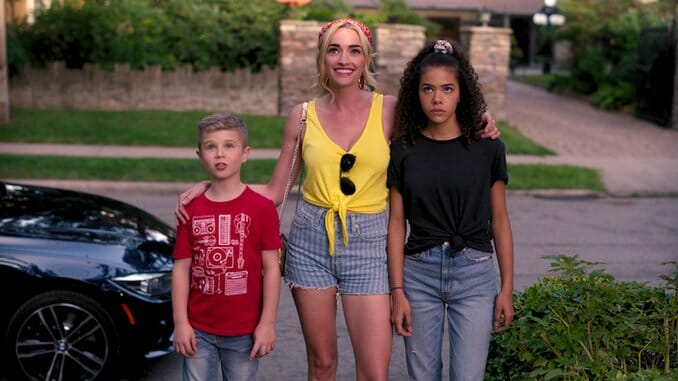Netflix’s Ginny & Georgia Is an Ambitious and Extremely Likable Coming-of-Age Story
Photo Courtesy of Netflix
Few series in recent memory have dared to be as fun and ambitious out of the gate as Netflix’s Ginny & Georgia, an engaging and suspenseful new dramedy about a mother-daughter duo that has invoked obvious—but frankly uninspired—comparisons to Gilmore Girls. Though the two shows share a picturesque New England setting, investigate topics of wealth and privilege, and feature competent single mothers who had children as teens, Ginny (Antonia Gentry) and Georgia (Brianne Howey) are far from this generation’s Rory and Lorelai.
A biracial 15-year-old whose parents had her when they were just teens themselves, Ginny has never had a stable life; her photographer father never stuck around for too long, and her mother frequently relocated their small family from town to town in search of normalcy and security. This has had the unfortunate but perhaps unsurprising effect of making Ginny a constant outsider whose struggles with her racial identity—her father is Black and her mother is white—have made it difficult for her to make friends and fit in at each new stop on the road to Wellsbury, Massachusetts, the wealthy and predominantly white town the family settles in at the beginning of the show. Ginny’s experience stands in direct contrast to the beautiful and exuberant Georgia, who has seemingly mastered the art of assimilation after years of practice. As such, Ginny silently resents her mother, blaming her for myriad issues in her life while also believing she’ll never measure up to the woman who raised her.
Of course the irony is that Ginny is more like Georgia than she realizes, a lesson that most of us learn about ourselves eventually after it’s much too late. But for much of the show’s breezy and thoroughly addictive first season, Ginny struggles to understand Georgia and the choices she makes for their small family, failing in the process to recognize the great lengths that Georgia has gone to keep Ginny and her younger half-brother, Austin (Diesel La Torraca), from experiencing the same tumultuous and unforgiving upbringing she did.
In a sense this is a fairly classic story about the often complex relationships that exist between mothers and daughters, as the latter get their first taste of freedom and begin to form their own opinions. In the hands of the show’s all-female creative team, led by first-time creator Sarah Lampert and first-time showrunner Debra J. Fisher, the show manages to capture this confusing and frustrating period in a young woman’s life with relative ease. And that extends to the show’s depiction of Ginny’s relationships with her new friends, especially the excessive and emotionally needy Maxine (Degrassi: Next Class’ Sara Waisglass) who quickly positions herself as Ginny’s best friend. These young women are authentically written to be self-absorbed and impulsive by nature. Everything that happens to them is either the best or worst thing that has ever or will ever happen because they don’t have the benefit of life experience or the ability to think about things in the long-term. They also rarely accept the consequences of their actions until it’s too late. It’s a tale as old as time.
However, much like its heroines, Ginny & Georgia has dreams of being more than what it appears to be on the surface. Those dreams manifest themselves in the form of multiple ambitious and overlapping storylines, including Ginny’s ongoing struggle with self-harm; Austin’s violent outbursts after being bullied at school; Georgia’s burgeoning relationship with the town mayor (Scott Porter) after scheming her way onto his reelection campaign; a private investigator looking into Georgia’s past; Ginny slowly twisting herself into knots so people will like her; and unrequited love on the part of local restaurant owner Joe (Raymond Ablack). This is not to mention the show’s references to racism, privilege, sexism, abuse, feminism, divorce, and even body image that crop up throughout the first season in an attempt to give voice to the countless issues affecting today’s teens.